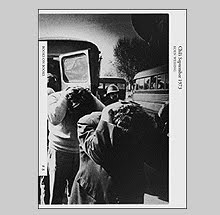Baghdad Calling by Geert van Kesteren

The United States isn't as good as it used to be at toppling foreign dictators and installing US friendly puppets. Long gone are the days of installing a leader like the Mohammad Reza Pahlavi into Iran or Augusto Pinochet into Chile and overlooking the brutality of their governance. We all know how the US was in bed with Saddam before he invaded Kuwait and complicated a US financial interest by preparing to drive up the price of oil. Once he did that and became a devil, the music to "spread democracy" was turned up to 11.
So...11 years later after one successful terrorist attack we stop pursuing the real culprit responsible for 9/11 and invade Iraq under false pretenses with a scared and misinformed American public providing the proper momentum. There is no real governmental plan for controlling what is being dismantled and when damage control is attempted it fails miserably due to incompetent governmental oversight.
The devil is caught in a spider-hole, fattened with Cheetos and then hung. As soon as he disappeared the country dissolved into complete chaos of a power struggle civil war that puts even human rights activists into an ethical quandary. At least when the devil ruled, people could go outside, shop at a market, have neighbors who followed a different religion, children could go to school, life could be lived if under a certain amount of dictatorial threat. Now rampant murder and kidnapping are the mainstay -- there are more ways to die than live. American troops there are seen as occupiers and hated. Five years and counting and in a perverse twist out of desperation, many Iraqis miss their devil and the safety they felt under his thumb.
If you'd like to know what Baghdad is like today then Geert van Kesteren's new book Baghdad Calling published by Episode books will give you an idea. It is a terrifying report from the world's most dangerous city.
Baghdad Calling is a book of assembled stories of Iraqi citizens living in Turkey, Syria, Jordan and Iraq and it isn't the work of one author but of dozens. Being that Baghdad is far too dangerous now for any foreign journalist to be wandering the streets, Geert has assembled a team of locals who document the state of their city with small digital cameras and cell-phones. These images are punctuated by Geert's photographs of the Iraqis that have sought refuge out of the country.
The amateur photographs portray a city that is desolate -- dead. When the cameras venture out of doors they are usually shooting out of car windows. When the camera operator is out on the street, the photos convey a strong sense of being exposed to danger. So much so that it is a relief to turn the page and find the observations continue and no immediate tragedy has occurred.
On one page spread there is a photo with a caption that reads, 'I was in my college talking to my friend's father who wanted us to convince this friend to return to Iraq to continue his studies and as we were talking this big explosion took place.' The photo shows the silhouette of a man in a sunny courtyard, beyond him is a small mushroom cloud of dust and debris pushing into the sky. Others describe the destruction of neighborhoods and the bodies that can be found littered along the roadsides, hands tied behind their backs. Shocking sights that are presented without the aesthetics of contemporary photojournalism. Direct responses made all the more horrifying by the sketchy image quality of the amateur tools.
Interspersed among groupings of double-page spreads of the amateur photographs are short texts that sandwich Geert's photographic contributions. The texts are the personal experiences from the Iraqis living in such chaos. Fascinating and well-written, they describe with horrifying detail the madness and psychological damage that has descended onto these lives -- leaving the reader to sit uneasily in its wake.
Baghdad Calling is a follow up to Geert's 2003 book Why Mister, Why? and it follows a similar approach in construction. Both use a thinner, less precious paper which is perfect bound together. Baghdad Calling reproduces the amateur photos on pages of newsprint while the text and Geert's photos are on thin but smoother paper for better image quality. The effect is one of switching from lo-fi hellish nightmare to high-fi fantasies of safety.
Due to the nature of the paper and materials, Baghdad Calling can be easily damaged. Even cursory reading leaves its marks on the cover and internal pages, which seems appropriate. This is a book about cause and effect. An appeal for us to ensure something will be done in response to the desperate needs towards people's safety and welfare. The damage needs to be attended to.
Baghdad Calling











